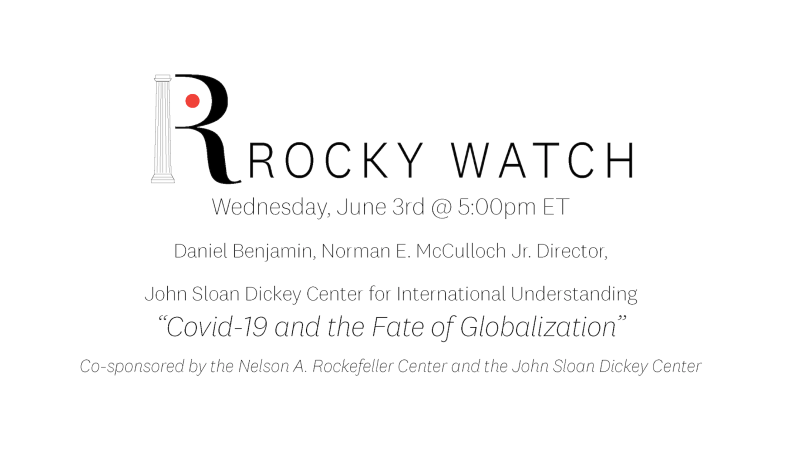
- Public Policy
- Leadership
- Funding
- News & Events
- About the Center
Back to Top Nav
Back to Top Nav
Back to Top Nav
Back to Top Nav
On Wednesday, June 3rd, 2020, Daniel Benjamin, Director of the Joan Sloan Dickey Center for International Understanding, spoke with Dartmouth students and community members at the Rockefeller Center’s final Rocky Watch event of the spring term. Rocky Watch is a weekly series of live broadcasts that the Center hopes will foster a virtual common space for community discussion in this time of social distancing and remote learning.
Prior to joining the Dickey Center in 2012, Benjamin served as Ambassador-at-Large and Coordinator for Counterterrorism at the U.S. State Department, as a senior fellow in Foreign Policy Studies and director of the Center on the United States and Europe at the Brookings Institution, and as Germany bureau chief for the Wall Street Journal. Ambassador Benjamin will be leaving the Dickey Center later this month to serve as president of the American Academy in Berlin. Benjamin’s lecture focused on the impact that the coronavirus is having on globalization and the international order.
Globalization, according to Benjamin, refers to the “accelerating transit of goods, ideas, and people across borders,” and he believes it has been the catalyst for much of the progress that we have seen over the past three decades. Benjamin notes that globalization has helped to raise “hundreds of millions of people” around the world out of poverty and that "the globalization of knowledge and accompanying development of computers have provided the basis for technical advances beyond our imagination.”
However, globalization has also helped to create and amplify global crises. “9/11,” Benjamin says, “was one such crisis spawned by globalization,” because global interconnectedness allowed the attackers to reach the United States. Additionally, the financial crisis of 2008, even though it originated in the United States, quickly spread to other countries because of the linkage of the world’s financial markets through globalization. The coronavirus, which originated in China and has spread across the globe, is the latest crisis to have emerged as a result of the world being increasingly linked.
With the coronavirus causing much of the world’s international travel, capital flows, and even intellectual exchange to grind to a halt, Benjamin believes that the “question before us is whether the pandemic has thrown the brakes on globalization.”
Answering this question, Benjamin first discussed the impact of the coronavirus on international travel. “We are not going to see travel along the lines of what we are used to” for a long time, Benjamin emphasized. “Air traffic is down 90%,” and even if a coronavirus vaccine were to be developed, Benjamin is not certain “that people will want to get on planes as much as they used to.” Moreover, a growing recognition “that pathogens like the novel coronavirus can find their way around the world with remarkable rapidity thanks to international travel connections” will make the recovery of international travel even more problematic.
From there, Benjamin moved on to the alarming implications that COVID-19 has for global trade and finance. “Global trade this year will be down by as much as a third,” Benjamin observes. Moreover, the coronavirus has thrown many of our global supply chains into disarray, illustrating “the peril of what has come to be known as just-in-time production and of global supply chains.” Going forward, Benjamin thinks that “policymakers across the political spectrum are not going to feel comfortable about letting [our reliance on just-in-time production and global supply chains] continue.”
Moreover, Benjamin argues that COVID-19 is poisoning the international environment. During the pandemic the U.S. has been “increasing its exclusion of foreign firms,” and the circulation of “rumors and innuendo” around the origins of the coronavirus are heightening tensions between the United States and China. Now more than ever, Benjamin says, “there is a lot of talk in Washington about decoupling or disentangling our economy from China’s.” Additionally, Benjamin believes the coronavirus is creating “pretty incredible tensions with our long-term allies,” pointing to efforts by the United States to lure a promising coronavirus vaccine producer away from Europe as an example of the strain between the U.S. and Europe. These tensions could make it more difficult to restart globalization once the pandemic has receded.
With rising international tension and the weaknesses of globalization becoming increasingly apparent thanks to the virus, Benjamin concludes that “nobody is going to endorse the kind of go-go globalization that we had in the ‘90s.” However, Benjamin asked the audience to “keep in mind that globalization really has benefited us in enormous ways for a long time.” Although excessive globalization may be detrimental, Benjamin hopes that we “figure out ways to explain to the American public the benefits of globalization.” Ultimately, Benjamin thinks that the coronavirus crisis holds profound implications for globalization, but it also underscores the extraordinary opportunities that exist for greater global collaboration. With luck, the world can use this moment to realize them.
-Written by Ben Vagle ’22, Rockefeller Center Student Program Assistant for Public Programs
Rocky Talk Podcast w/ Daniel Benjamin: Apple Podcasts and Spotify.